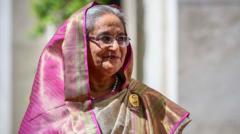Ousted Bangladeshi PM Sheikh Hasina made a request to come to India “at very short notice”, the Indian foreign minister told parliament.
Ms Hasina fled from Bangladesh to India on Monday evening after a political crisis toppled her government.
Foreign Minister S Jaishankar did not mention how long she would stay in the country or what her next steps would be.
In his first official comments since the crisis peaked in Bangladesh, he said India had been in regular contact with authorities in Dhaka over the past 24 hours.
Ms Hasina resigned on Monday after weeks of deadly anti-government protests. The country’s army chief has promised that an interim government will be formed and new elections will be announced.
India shares a 4,096km (2,545 miles)-border with Bangladesh and has close economic and cultural ties with the country. There are worries that prolonged tensions in Bangladesh could spill over into India, which is seen as having supported Ms Hasina through her 15-year-long tenure despite her clamping down on dissent and jailing opposition leaders.
On Monday, India deployed additional troops along its border with Bangladesh.
Mr Jaishankar said the situation there was “still evolving” and that the government was in “close and continuous touch with the Indian community” through its diplomatic missions. The minister said there are 19,000 Indians, including 9,000 students, in Bangladesh and added that most of the students had returned to India in July.
He said India was monitoring the situation regarding the status of minorities in the country.
“There are reports of initiatives by various groups and organisations to ensure their protection and well-being. We welcome that but will naturally remain deeply concerned till law and order is restored,” he said.
Earlier in the day, Mr Jaishankar briefed opposition parties on India’s response to the developments in Bangladesh. Prime Minister Narendra Modi also held a meeting on Monday to review the situation.
Five Indian states share a border with Bangladesh, which was formed in 1971 after a war with Pakistan. According to government data from last November, around 915.35km of the border is not fenced.
From a security perspective, Ms Hasina’s tenure was relatively peaceful for India as she had cracked down on anti-India militants in her country. She had also granted transit rights to secure trade routes for the states bordering Bangladesh.
On Monday, top officials of India’s Border Security Force (BSF) visited the Bangladesh border in the eastern state of West Bengal to review “operational preparedness and strategic deployment of BSF in these important border areas”, a spokesperson said.
The BSF said, external “it has received strict instruction from the government to not allow anyone into the country without valid documents”.
Train services between India and Bangladesh have been suspended “indefinitely” – they had been halted since mid-July after violent protests broke out in Bangladesh.
On Monday, following Ms Hasina’s resignation, the north-eastern state of Meghalaya imposed a night curfew along its border with Bangladesh.
In West Bengal, the state which shares the longest border with Bangladesh as well as close linguistic and cultural ties, Chief Minister Mamata Banerjee has appealed for peace.
Movement of goods through the Petrapole land port on the border has also been stopped. Reports say hundreds of Indian trucks are stuck on the Bangladesh side.
A senior diplomat told the BBC on Monday that India “doesn’t have too many options at this point in time”.
“We have to tighten control on our borders. Anything else would be construed as interference.”
Follow BBC India on Instagram, external, YouTube, external, Twitter, external and Facebook, external

